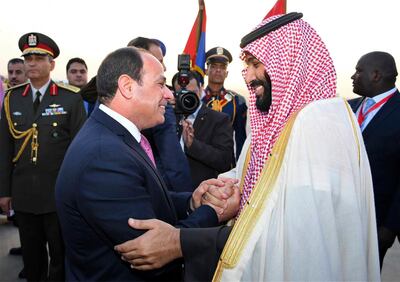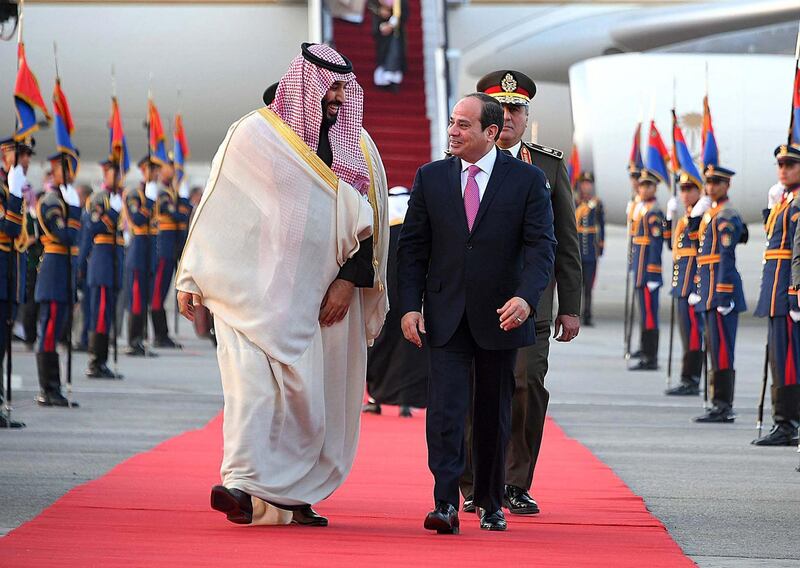Saudi Arabia's Mohammed bin Salman arrived in Cairo on Sunday on his first foreign visit since being appointed crown prince last June, with Egyptian officials hoping to co-ordinate positions on regional conflicts, the boycott of Qatar and concerns over Jerusalem.
The 32-year-old heir to the Saudi throne was welcomed at the airport by President Abdel Fattah El Sisi, who has launched ambitious economic development projects with the help of Saudi financial assistance and is seeking endorsement of his policies in presidential elections this month.
The crown prince's three-day trip to Egypt – described by Mr El Sisi’s spokesman as his “second homeland” – includes a visit to the National Youth Academy in suburban Six of October City, reflecting his shared interest with Mr El Sisi in wide-reaching civil service reforms. The newly inaugurated academy is under direct presidential supervision and aims to train young people for public service.
Sources in the presidential palace said the prince will underscore his commitment to Egyptian youth by pledging to build a new university in the Sinai.
The prince is also scheduled to meet Pope Tawadros II, head of Egypt's Coptic Orthodox Church, at St Mark's cathedral in Cairo and attend a performance at the Cairo Opera House on Monday.
But observers expect talks between Egyptian officials and Prince Mohammed, whose dynamism has shaken up traditional diplomatic, security and political arrangements in the region, to focus foremost on its newest and the oldest divergences: the nine-month-long standoff with Qatar and the 70-year Israeli-Palestinian stalemate.
“Bin Salman is handling all the important international files for Saudi Arabia at a moment of tremendous confusion in the region,” said Gehad Auda, professor of international relations at Helwan University.

There is increasing anxiety in Riyadh and Cairo over President Donald Trump’s promised Middle East peace plan as American media intensifies scrutiny of how all the regional players have sought to court favour with the American administration.
“When it comes to the 'deal of the century' both Egypt and Saudi Arabia are running into difficulties with the Palestinians, the Jordanians, the Israelis and the Americans and the two leaders know they must make a serious assessment of the situation to advance a co-ordinated Arab position,” Mr Auda said.
Egyptian officials hope Prince Mohammed will be able to present a common stance on the Israeli-Palestinian issue, the conflicts in Syria and Yemen, and the boycott of Qatar over its support for terrorism when he visits Britain on Wednesday and the US later this month.
_________________
Read more:
[ Touring Mohammed bin Salman eyes partners for change ]
[ UK seeks closer Saudi Arabia ties with Mohammed bin Salman visit to London ]
_________________
As the prince’s advance team arrived in Cairo on Thursday to finalise arrangements for the visit, Egyptian petroleum minister Tarek El Molla announced that Saudi Aramco had promised the free supply of 500,000 barrels of crude per month for six months.
The transfer tens of millions of dollars worth of fuel in addition to billions in grants and soft loans from Saudi Arabia has helped Egypt improve its international credit rating and bolster its foreign currency reserves.
Saudi aid has been crucial for Mr El Sisi who has launched a series of massive projects including a relocation of the government to a new capital between Cairo and the Suez Canal and construction of New Alamein city on Egypt's Mediterranean coast.
Crown Prince Mohammed's vision of Neom – a new business and industrial city powered by clean energy that will be built adjacent to Jordan and Egypt – has captured the imagination of young entrepreneurs and investors in the three countries.
“The prince is a risk taker – the cultural reforms around opening movie theatres and allowing concerts, and big initiatives like Neom may seem crazy to some but shows a disruptive kind of leadership and vision,” said Mohamed Salah, 26, the Egyptian co-founder of Social n’Tech, an Amman-based digital content firm.
“I believe MBS is a good ally to Egypt which is benefiting in many ways from the relationship, as are the Saudis,” he said, using the acronym by which the crown prince is popularly known.
Yet despite the promise of the free flow of goods and people that would come with the proposed King Salman Bridge linking the two countries across the Gulf of Aqaba, Cairo's decision to transfer the Red Sea islands of Tiran and Sanafir to Saudi Arabia still rankles with many Egyptians.
On Saturday, Egypt's top court dismissed all legal challenges to the agreement, which was announced in 2016 as Mr El Sisi moved to bring the Saudis into the framework of the 1979 Camp David Peace accords and to secure the kingdom's financial assistance for his development projects.
“Egyptian youth is sceptical of the Saudi crown prince because of the islands deal,” said Mohamed Soliman, former spokesman for the liberal Dostour Party and Open Society Foundation graduate scholar at Georgetown University.
“Many feel the transfer deal came to showcase MBS as a Saudi champion at the expense of Egyptian territorial sovereignty.”





